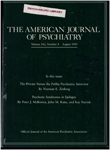Are hysterical seizures more than hysteria? A research diagnostic criteria, DMS-III, and psychometric analysis
Abstract
In a double-blind study the authors compared severity of psychopathology and personality organization in three groups of patients: those with organic (neurogenic) seizures alone (N = 11), those who exhibited both neurogenic and psychogenic ("hysterical") seizures (N = 13), and those with pure psychogenic ("hysterical") seizures (N = 13). Patients with neurogenic seizures were found to have alcoholism, anxiety disorder, and minor affective disorder. Patients with mixed and psychogenic seizures had more severe psychopathology, including major affective disorders and major character pathology. Patients with mixed and psychogenic seizures also had a markedly higher incidence of suicide attempts and past history of psychiatric treatment.
Access content
To read the fulltext, please use one of the options below to sign in or purchase access.- Personal login
- Institutional Login
- Sign in via OpenAthens
- Register for access
-
Please login/register if you wish to pair your device and check access availability.
Not a subscriber?
PsychiatryOnline subscription options offer access to the DSM-5 library, books, journals, CME, and patient resources. This all-in-one virtual library provides psychiatrists and mental health professionals with key resources for diagnosis, treatment, research, and professional development.
Need more help? PsychiatryOnline Customer Service may be reached by emailing [email protected] or by calling 800-368-5777 (in the U.S.) or 703-907-7322 (outside the U.S.).



